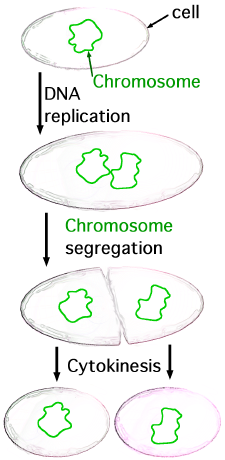binary fission

In biology, fission is the subdivision of a cell (or body, population, or species) into two or more parts and the regeneration of those parts into separate cells (bodies, populations, or species).
Binary fission produces two separate cells, populations, species, etc., whereas multiple fission produces more than two cells, populations, species, etc.
Binary prokaryotic fission, which is binary fission, is a form of asexual reproduction and cell division used by all prokaryotes, (bacteria and archaebacteria), and some organelles within eukaryotic organisms.
This process results in the reproduction of a living prokaryotic cell by division into two parts that each have the potential to grow to the size of the original cell. This type of division takes place without the formation of spindles. The single DNA molecule first replicates, then attaches each copy to a different part of the cell membrane. When the cell begins to pull apart, the replicate and original chromosomes are separated. The consequence of this asexual method of reproduction is that all the cells are genetically identical, i.e. have the same genetic material.























